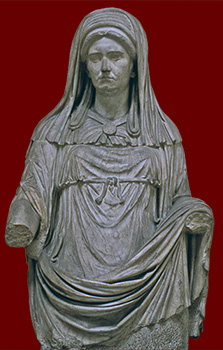
Virgo Vestalis Maxima
from Atrium Vestae, Rome, 3rd century CE

Occia achieved the position of Virgo Vestalis Maxima when she became the oldest living priestess of the goddess Vesta, perhaps 57 years before she passed away in 19 CE. Including her death among the events which close Annales II, Tacitus observes that the Emperor Tiberius, as Pontifex Maximus and guardian of the priestesses, was obliged in 19 CE to select a new young priestess to complete the State's complement of six Vestals. He notes briefly but significantly that Occia had given impeccable service to the goddess Vesta on behalf of the Roman people. Tacitus's announcement of the virtuous Occia's passing stands in vivid contrast to his narration in the previous section (85) of the shocking behavior of Vistilia, a much-married upper-class matrona who challenged not only traditional expectations but a law of the Senate by registering herself as a prostitute with the aediles. Occia, at the end of her 30-year term as a Vestal, when she was between the ages of 36-40, had made her own decision to commit to her life as a Vestal, safeguarding the State by maintaining Rome's pax deorum (accord with the gods) with her chastity. As a prepubescent girl of 6-10 years, Occia would have been given by her parents into the hands of the Pontifex Maximus in 32-28 BCE, during the final chaotic years of the civil wars between Antony and Octavian and the latter's consolidation of his sole power in Rome (31 BCE). Too young at first to feel the political pressures of the State, she would have been focused on adjusting to her new home, the Atrium Vestae (drawing) in the sacred area of the Roman Forum, learning her duties in the Aedes Vestae, participating in State rituals, schooling herself to obedience, and eventually modeling the appearance as well as the conduct of Vestal purity. As an adult Vestal Occia would have experienced the new regime of the imperial Pontifex Maximus under Augustus (24 BCE-14 CE). As Vestalis Maxima, her rise to leadership would have been noted by Livia Augusta (d. 29 CE) and the succeeding Pontifex Maximus, Tiberius. In this passage Tacitus describes the competition between Gaius Fonteius Agrippa and Domitius Pollio to win favor from the emperor and status for their family by offering their young daughters as Vestals. Although powerless themselves except as sacred symbols of the wellbeing of the State, the Vestals were informally influential in public affairs. Julius Caesar, long-time Pontifex Maximus (63-44 BCE), upon his third consulship in 46 BCE coined an aureus with the veiled head of Vesta on the obverse, in acknowledgement of the intercession of the Vestals against his proscription by Sulla in 83 BCE and as affirmation of his power. Augustus included the Vestals in all public religious observances, depicting them in procession on the wing of the inner altar of the Ara Pacis. On the Cancelleria Relief B a Vestal, attended by her lictor curiatius, is prominent among the officials participating in Domitian's welcome of Vespasian into Rome as emperor in 70 CE. The general Postumus minted a coin in Germany in 263 CE on which he, self-appointed emperor of the Gallic Empire, is welcomed by the Vestals before the Temple of Vesta. The Christian Emperor Theodosius I, in an effort to end paganism, disbanded the long-standing order and had Vesta's hearth fire extinguished at the end of the 4th century CE.
An important ancient source for the requirements and practice of choosing a Vestal is Aulus Gellius, Noctes Atticae I.12. 1-19; other Vestal texts on Companion are: Postumia, from Livy's Ab Urbe Condita and monumental inscriptions, from the courtyard of the Atrium Vestae.
For further information about the Vestals, consult Parker (2004), Staples (1998), Takacs (2008), Wildfang (2006) in the Bibliography.
(1) Post quae rettulit Caesar capiendam virginem in locum Occiae, quae septem et quinquaginta per annos summa sanctimonia Vestalibus sacris praesederat; egitque grates Fonteio Agrippae et Domitio Pollioni quod offerendo filias de officio in rem publicam certarent.
(2) Praelata est Pollionis filia, non ob aliud quam quod mater eius in eodem coniugio manebat; nam Agrippa discidio domum imminuerat. et Caesar quamvis posthabitam decies sestertii dote solatus est.
Click on the underlined words for translation aids and commentary, which will appear in a small window. Click on the icon link![]() to the right of the line for related images and information.
to the right of the line for related images and information.